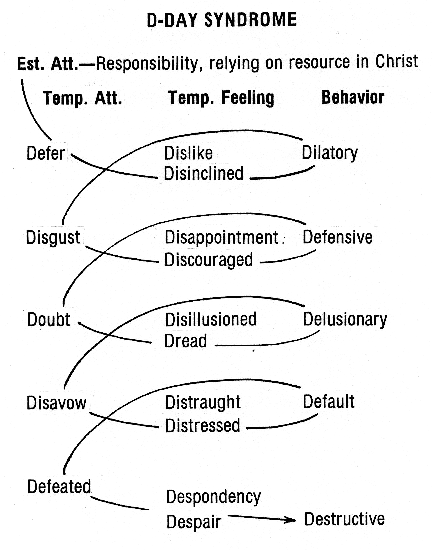©
1999 James A. Fowler
You are free to download
this outline provided it remains intact without alteration. You
are also free to transmit this outline electronically provided
that you do so in its entirety with proper citation of authorship
included.
DEPRESSION
I. Scriptural statements about depression.
A. Use of word "depressed"
in NASB
1. II Sam.
13:4 -"Why are you so depressed morning after morning?"
2. II Cor.
7:6 - "God, who comforts the depressed, comforted us by
the coming of Titus."
B. Some examples of depression, discouragement,
dejection, etc.
1. Job-
Job 7:3-11 -"without hope (6); God doesn't care (8); bitterness
(11)
2. Moses
- Numb. 11:10-15 - "burden (11); burdensome (14); suicidal
(15)
3. Elijah
- I Kings 19 - "fearful (3); suicidal (4); self-pity (14)
4. David
- Ps. 42,43 - "soul in despair (42:6); disturbed (42:11);
God has rejected (43:2);
mourning
(43:2)
5. Asaph
- Ps. 73 - "envious (3); questions God's sovereignty (11);
embittered (21)
6. Jonah
- displeased, angry (4:1,4,9); suicidal (4:3,8,9)
7. Jesus?
- Matt. 26:37; Mk. 14:33 - (JBP-"desparately depressed")
Greek word ademeneo
means
"to be filled, glutted" with anguish, heaviness of
heart and emotional concern.
II. Defining depression.
A. Used in English to refer to everything
from mild discouragement to manic- depressive; from
"Monday
morning blues" to "masochistic blow- out."
B. Webster's Dictionary defines as "gloomy,
dejected, sad, discouraged, despondent, feeling of
inadequacy."
C. Greek words
1. II Cor.
7:6 - tapeinous - "lowly, cast down, brought low"
2. II Cor.
4:8 - exaporeomai - from ek=out of; poreuomai=way
through. "No way through!"
No
hope! despairing!
III. What brings on depression?
A. Presenting causes.
1. Non-personal.
a.
Death of loved one
b.
Reversal of pleasurable circumstances
c.
Sickness, exhaustion, hormonal changes, inadequate nutrition
d.
Everything is so bad; life is so hard; world is a mess; hopelessness.
e.
Tasks seem overwhelming - student, wife, work
f.
Feel trapped in marriage, parenting, job, financial bind
2. Inter-personal.
a.
Mistreated, oppressed, mocked, rejected
b.
Taken advantage of
c.
Inadequacy to meet expectations of husband, boss, children
3. Intra-personal.
a.
Unrealized aspirations - to be married, have children, home,
get raise, be successful
b.
Unfulfilled desires of worth, identity, belonging, usefulness,
etc.
c.
Feeling inadequate to respond to repetitive indulgent desires
to eat, drink, sex, etc.
d.
Self-pity, envy, jealousy
B. Behavioral cause.
1. Selfishiness
- Personal interest - Isa. 53:6
2. Guilt
a.
of failing to respond to God's opportunities by relying on God's
sufficiency.
b.
of wrong action - personal aspiration, gratification, reputation.
(1)
immorality
(2)
negligence
c.
of wrong reaction - fight, fright, flight.
(1)
anger
(2)
resentment, bitterness
C. Root cause.
1. Delusion
of the Deceiver, Satan, "the father of lies" (John
8:44)
2. Promotes
hopelessness. God in Christ not sufficient.
IV. Response to depression.
A. Inadequate responses.
1. Diversion
- "keep smiling; it will go away; things will get better."
2. Direct
action - "Operation bootstrap; Shape up and get your act
together; Get on the stick
and
get out of the spin."
3. Discovery
of "victimization" and symptomatic causes for lack
of self-esteem.
B. Biblical responses.
1. Acceptance
of discouragement and frustration. Not wrong to get "down."
Problem comes
when
we are "down and out" in despair, believing that there
is "no way through." (II Cor.
4:8)
2. Confession
of sin that causes guilt - I John 1:9
3. Faith
a.
recognizes God's presence - Matt. 28:20
b.
recognizes God's sovereign sufficiency - Job 42:2; II Cor. 3:5
God's
grace - II Cor. 12:10
God's
Spirit - Gal. 5:16; Eph. 5:18
God's
preservation - Phil. 1:6
c.
is receptive to His activity. Heb. 11:6
d.
is a trusting contentment with God's provision in all His providential
opportunities - Phil.
4:11-13;
I Tim. 6:6-8; Heb. 13:5
4. Hope
- Confident expectation of God's continuing activity. I Tim.
1:1
|
















